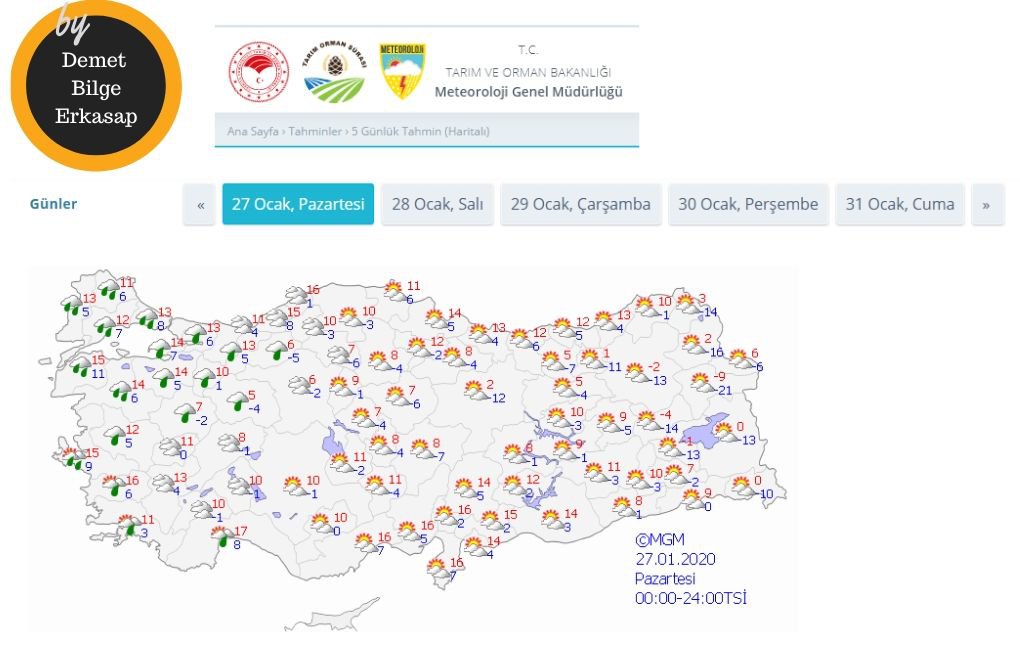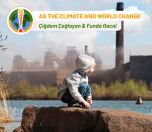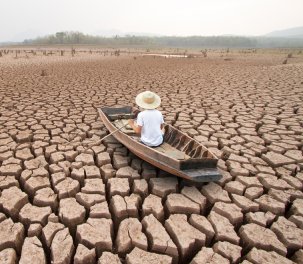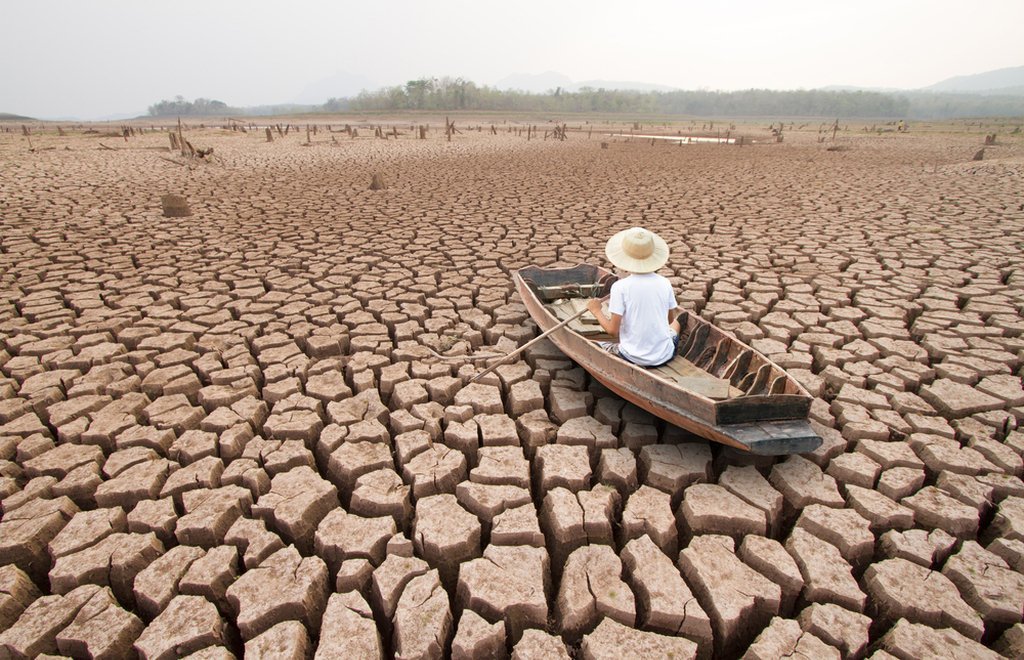Click to read the article in Turkish / Kurdish
I remembered a news article that I penned for daily Radikal 13 years ago. A January when the expectations for snowfall were delayed in each passing week... Sunny weather was recalling the spring from time to time. I talked to citizens upon the direction of our news director Hakan Çelenk.
Everyone was happy that the weather was still good. They had not yet had to use their spare coals and were enjoying their short commute by foot.
In other countries, life stood still due to snowfall and people died of cold in the same season. The crisis was impending and, even back then, experts were warning the state, calling on them to "take precautions, start using renewable resources, decrease carbon emissions..."
However, "climate change" had not yet been called a "crisis."
Climate crisis after 13 years
13 years later, we are again in a January without any snowfall. The picture on the headline is from the website of the Directorate General of Meteorology (www.mgm.gov.tr) where it shares its weather forecasts.
Despite the warnings given last week, we can infer from the map that it will not snow, at least for another day...
However, we now talk about a "climate crisis", not about "climate change."
There are now no spare coals, but hundreds of lira of natural gas bills even when we heat our houses in the lowest temperature possible. The winter sun is now the indicator for a far more serious issue than a mere love song. The news that goes like "Children enjoyed the hot weather on a day reminiscent of summer" is not cheerful life news any longer. It does not snow and children from all across the world are making a call to the states that have not listened to any advice for years: "Our home is on fire, the earth is warming, take precautions now... We are dying out..."
Climate crisis is one of the main items on the agenda of bianet. We published an important article series for three months from October to December 2019: "Articles on Climate Crisis"
We tried to approach the current climate crisis in all aspects: Agriculture, women, children, warming, drought, youth, health, environmental pollution, biodiversity, forests, ecosystem, local, national and international policies... Under all these headlines, we asked academics, activists and experts to write articles. This file consisting of 15 articles was also an "emergency call for climate." Each article revealed the situation and contained a warning.
While we are again going through a January without snowfall, I would like to summarize this important file once again here.
Climate policies
Speaking to climate activist Elif Ünal, Ümit Şahin from İstanbul Policy Center underlined the inadequacy of policies on climate crisis:
"Even though the governments abide by their nationally determined contributions declared before the Paris Agreement, a global warming of 3, or even 3.5 degrees celsius, is certain. (...) Turkey looks like a country striving for more financial support in international efforts. In that sense, the climate policies of Turkey have come to a deadlock."
Lawsuits over climate
Gökşen Şahin, the Communications Director of Peoples' Lawsuit over Climate, penned an article on the ongoing lawsuits around the world filed over climate. According to Gökşen Şahin's article, there are over 100 lawsuits over climate going on in 28 countries. Şahin listed the essence and importance of these lawsuits in following words:
"On the one side, millions of people take to the streets and join climate strikes; on the other side, they file criminal complaints against governments and fossil fuel companies at the national and international courts as well as at the United Nations (UN) commissions. These lawsuits take down the responsibilities of governments and fossil fuel companies in climate crises on official expert reports and scientific reports."
Climate activists
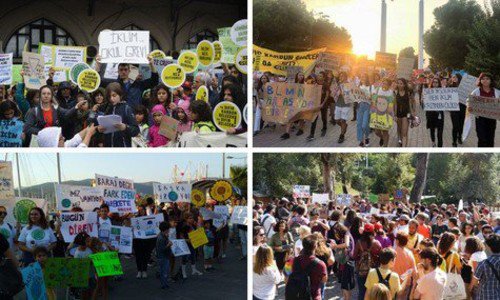
As it was also the case in several parts of the world, Turkey also experienced mass demonstrations of children and young people for climate in 2019. Elif Ünal from Extinction Rebellion joined our article series by writing on climate movements in Turkey:
"In the strike that was staged to draw attention to the UN Climate Summit on September 23, 10 thousand people took to the streets and 40 thousand people striked for climate in schools in 20 different cities in Turkey. The strike joined by 7.6 million people around the world became the biggest demonstration for climate crisis in both Turkey and the world.
"We are running out of time. That being the case, we will see more and more climate activists on the streets in the upcoming period."
Women are outraged and right
Menekşe Kızıldere, the Coordinator of Environmental Policies Projects, approached the struggles for climate crisis and its effects from the viewpoint of gender equality:
"There were so many instances in the past when - instead of women - all-male groups talked and took decisions. There were so many instances when women were excluded from technical issues and they were even subjected to long and ridiculous statements...
"They are outraged for that reason. They are right in asking why we are not equal while we wage the same struggle by making the same effort."
Lack of air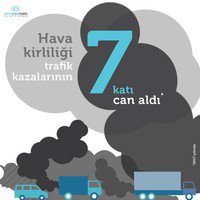
"While humans can survive for six weeks without food and can survive for six days without water, they can live only for six minutes without air."
That was how Right to Clean Air Platform Coordinator and Clean Future Association Secretary General Buket Atlı began her article on climate crisis and air pollution. Atlı's article gave detailed answers to the following questions: "What is the quality of the air that we breathe in Turkey? How can we understand that the air is polluted? How does polluted air affect our health? What can we do to increase the air quality?"
The climate crisis and agriculture
Abdullah Aysu, the Founding Chairperson of the Farmer Unions' Confederation (ÇİFTÇİ-SEN) and the Chairperson of the Grain Producers Union (HUBUBAT-SEN), wrote on the impact of the climate crisis to agriculture. In his article, Aysu says the traditional method of production (the wise villager production) has a preventive role against the expansion of climate change: "All of these energy types in use eat up nature. In other words, it destabilizes the climate, moves us closer to catastrophe and extinction not step by step, but with quick steps."
Forest fires and ecosystem
İstanbul University Cerrah Paşa Faculty of Forestry Department of Soil Science and Ecology Faculty Member Prof. Dr. Doğanay Tolunay wrote on the relation of the crisis with the ecosystem and forest fires: "It is possible to say that there will be an extra CO2 emission from the prediction that forest fires will increase with the increasing temperatures and droughts."
At the time we published Prof. Dr. Tolunay's article, the fires began in Australia in September was continuing. Being criticized regarding climate policies, Australia experienced the crisis in the most tangible way in 2019. Millions of hectares of land were razed in the fire, the ecosystem was damaged and tens of people lost their lives.
Biodiversity
Speaking of the ecosystem, Aslı Gemci, who is responsible for the policy and advocacy work of WWF (World Wide Fund for Nature) Turkey, told how the climate crisis destroys biodiversity: " If the 2°C scenario takes place in global temperatures, almost 25 percent of the species in the 35 priority regions, including the Mediterranean, face the risk of extinction."
The floor is children's
.jpg)
It was unthinkable not to give the floor to children who were at the forefront of the struggle against the climate crisis. Bilge Yerli, a 16-year-old high school student, said in her article: "We will continue to make our voices heard. We admit that children being on strike is not a sustainable solution. But children will not leave strikes unless we are presented with a future that will make it valuable for us to study, learn. We are here until the radical changes are made, we are on the street, we are on school strike for the climate."
Environmental expenditures
İstanbul Bilgi University Department of Economics Faculty Member Prof. Dr. Nurhan Yentürk, who is also the Director of the university's Non-Governmental Organizations (NGO) Research and Training Unit, reviewed environmental protection expenditures made from the public budget by central government agencies and local administrations. Prof. Dr. Yentürk conveyed this information, which needs to be discussed in the struggle against the climate crisis: "It is useful to state that public resources were allocated for the struggle against the climate crisis only in the strategic plans of the Ministry of Environment and Urbanism (11 million TRY) and the Ministry of Food, Agriculture and Livestock (2 million TRY) and this resource is almost nonexistent."
COP25 and Turkey
United Nations Climate Change Conference (COP25) was held in Spain's capital Madrid. Menekşe Kızıldere wrote her impressions from the GOP25. Kızıldere's evaluation regarding Turkey's stance was: "Turkey, because it failed to carry its point throughout the negotiations, got the floor in the main session and said, 'We have been left behind. We will be silent.' This stance of Turkey is sad enough."
COP25, states and those who resist
Ömer Madra, Açık Radyo's (94.9) editor-in-chief, programmer and founder and an environmental activist drew attention to the mobility of the youth activists against the callousness of the states. "The COP25 ended with a complete defeat for living beings on Earth and above. World leaders did not make the least effort to achieve the goals.
"But the collective organization of children, youth, and indigenous leaders at the climate summit was just as unique: The seekers of justice were doing the resistance dance called
'Discobedience'."
Climate movements and their language
Bilgi University Department of Arts and Culture Management Faculty Member Dr. Alper Akyüz wrote about "the climate crisis and communication," approaching the matter from a different point of view. He pointed out important points about the translation of predictions of science and political negotiations into everyday language. Akyüz discussed the words and actions of the climate movement from this perspective.
Drought
And of course, the drought. Prof. Dr. Bülent Kurnaz, the Director of the Boğaziçi University Center for Climate Change and Policy Studies, wrote on this subject, which is one of the most important topics of the climate crisis. In his article where he stressed the changes in the precipitation regime Prof. Dr. Kurnaz warned, "Droughts are expected to be both more often and more severe."
Public health
Water is decreasing, the air is being polluted, the ecosystem is being annihilated, carbon emission is increasing. Of course, all these coming together requires a topic to be started for public health. Uludağ University Faculty of Medicine Department of Public Health Faculty Member Prof. Dr. Kayıhan Paka ended his article, where he told about diseases, with a very important warning: "An approach of systematic monitoring and evaluation of the health impacts of the climate crisis and of taking protective measures are not yet in question." (DB/SD/VK)





